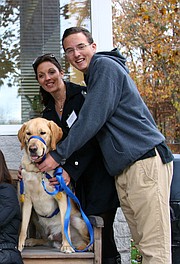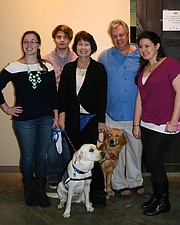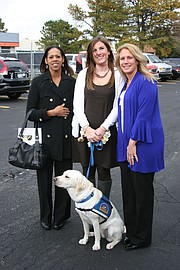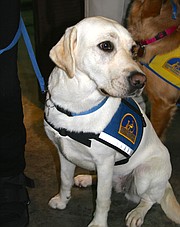Tucked away on a graying back road in Long Island, N.Y., is a different kind of college campus. With wide grassy play yards and kennels instead of dorm rooms, this college is one for the dogs.
The Miller Family Campus is just one of many regional headquarters scattered around the country for Canine Companions for Independence (CCI), a non-profit organization that “enhances the lives of people with disabilities by providing highly trained assistance dogs and ongoing support to ensure quality partnerships,” according to its website at cci.org. Here, at the campus, dogs work with professional trainers to perfect the skills that set them apart as service dogs.
But before that, there is a lengthy process carried out by volunteers all over the country. These are the Puppy Raisers – the ones who foster the specially-bred puppies for 18 months, and are tasked with socialization, behavior training and the mastering of more than 30 commands – and Clifton resident Stephanie Dagata is one of them.
“We originally didn’t want a dog because of the 12- to 13-year commitment,” Dagata said. “My kids would write ‘Top 10’ reasons why we needed a dog, but I knew it would be me taking care of it.” Saying that after finding out about CCI when her neighbors became Puppy Raisers, she agreed to try it. “I knew I could do it for the 18-month commitment, especially with CCI’s support network.”
Dagata’s neighbors, the Masters family, recently had one of their puppies graduate from the program as a facility dog. The dog, Mega, is now working at the Nassau County District Attorney’s office in the Special Victims Bureau with Assistant District Attorney Amanda Burke.
“One of her primary duties is going to just be a love to the kids and adults who come into the office, and calm them and provide that unconditional love and non-judgmental support that people need when they’re going through stressful times,” Burke said. “That’s the most basic, but she’s so much more than just a dog that you can love and cuddle on. She has all of these skills that she’s learned through Canine Companions that I think will be useful too.”
Burke continued: “When a child comes into the office – let’s say – and is extremely stressed about meeting us, about being in a potentially scary environment, showing that child how Mega knows how to turn on a light or to pull open a drawer will ease that tension and break that ice with the child. She can help put them in a more open state of mind that this isn’t a scary place, and I think that’ll help make them feel more safe and secure.”
For some, however, that journey to graduating from the program has just begun. Dagata, a first-time Puppy Raiser, recently returned her dog Butch for advanced training at the Miller Family Campus and attended the graduation ceremony, where the dogs that have completed advanced training are given to the people who need them and begin their lifelong partnership. Tissues are strategically placed around the room, as there is often a lot of crying – some from sadness as Puppy Raisers part with the dogs they’re turning in for advanced training, but mostly from happiness as it’s clear how big a difference these dogs will make in the future of someone who needs them.
“I did enjoy seeing the graduation and the people who need these dogs, and understanding the important jobs that Puppy Raisers do,” Dagata said. “That’s why I’m more comfortable now. [Butch] is in a place where people will love him and train him and take care of him. I know when he graduates he will be with someone who loves him. That to me was the end goal.”
For more information on CCI or puppy raising, visit cci.org.



